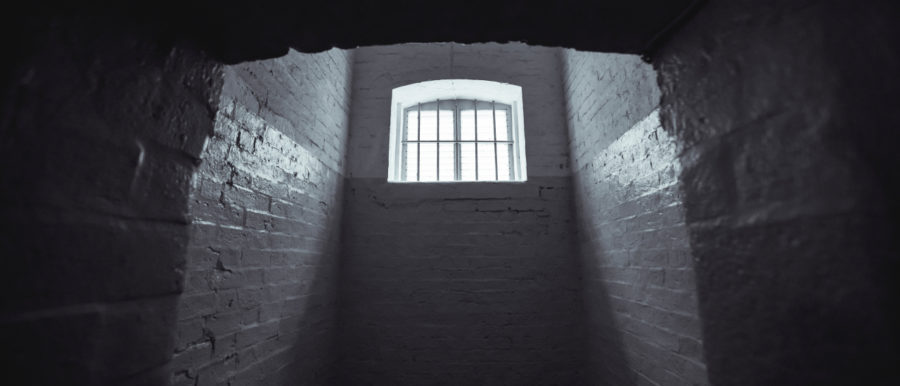The Prison Abolition Collective at the University of Massachusetts hosted a panel discussion titled “The Pandemic Behind Bars: Covid-19 in U.S. Prisons” on Tuesday. The event featured five speakers who have been at the vanguard of the pandemic in prisons for the last year.
The panelists, most of whom have been previously incarcerated, highlighted the inhumane conditions of COVID-19 isolation areas in prisons. They discussed the overarching implications of the negligence toward incarcerated people seen throughout the pandemic as well as other topics related to the state of the prison system.
Ernst Fenelon Jr., one of the five panelists, is an author, public speaker and program coordinator with the Prison Education Project. He stressed the importance of advocacy in regard to healthcare in prisons.
“It’s so important that we’re all here, and all of you are part of this experience and conversation, to advocate for those who cannot advocate for themselves,” he said.
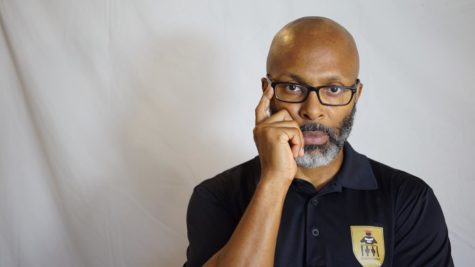
Razvan Sibii, a senior lecturer in the UMass journalism department, moderated the event. A freelance journalist, Sibii teaches several courses at UMass, including those about the mass incarceration system, journalism workshops in the Hampshire County Jail and social justice journalism to a mixed class of UMass students and incarcerated men. He also writes a monthly column in the Daily Hampshire Gazette about incarceration and immigration.
The event kicked off with opening remarks from Claire Healy, one of the event organizers and a member of the Prison Abolition Collective, who highlighted the significance of hosting the event moments after the guilty verdict for Derek Chauvin was delivered.
The panelists introduced themselves and briefly explained their connections to incarceration and COVID-19. The floor was then opened up for audience questions. This led to discussions about data transparency, vaccine distribution and prioritization, maintaining personal autonomy, information blackouts, healthcare rights of prisoners, and ensuring the accurate representation of incarcerated individuals.
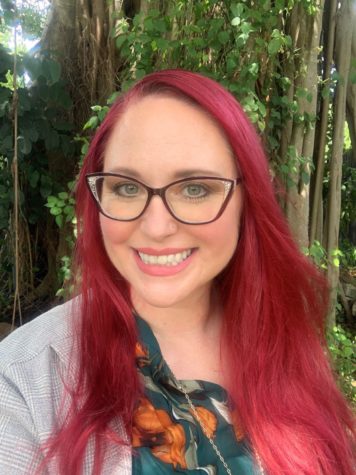
Kathryn M. Nowotny, one of the panelists, is an assistant professor of sociology at the University of Miami. There, she researches what she describes as “intersection between criminal justice and public health.” She is also the co-founder of the COVID Prison Project, which collects information to create a database on the “state of COVID-19 within correctional facilities in and around the country.”
Nowotny highlighted the fact that incarcerated individuals are three times more likely to die of COVID-19 than those who are not. She also presented other stark statistics, including that 390,000, or 30 percent of the prison population, have been infected with COVID-19.
However, Nowotny believes these numbers are a “gross undercount.” She cited reasons for this, including the lack of data transparency, standardization and oversight in reporting COVID-19 cases. She also stated that the slow process of reporting deaths in custody and the low number of actual autopsies being performed also played a role in this inaccuracy.
“Prisons, in a lot of ways, amplify disease risk,” said Nowotny, describing the crowded and unsanitary conditions, as well as the lack of access to sanitary products like hand sanitizer, that exist in prisons.
Reflecting on the event, Nowotny praised the selection of panelists.
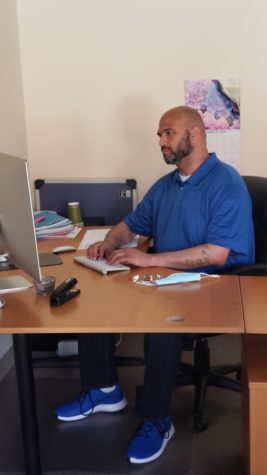
“I was the only person that didn’t have lived experience of incarceration on the panel, and I think that’s really critical to hear from that kind of expertise,” she said. “That kind of firsthand narrative account is really hard to get outside the prison walls.”
One of the panelists, Eugene Youngblood, endured firsthand these unsafe conditions after contracting COVID-19 in prison.
Youngblood was in prison for 29 years, where he was a leader in the Black Prisoners’ Caucus. Thirty days after finding out that his sentence was being commuted due to executive clemency from the governor, Youngblood contracted COVID-19 and spent 12 days in “medical isolation.”
He explained that all 375 people in his unit tested either positive or inconclusive. After medical isolation, 125 individuals were moved to a gym, exceeding its capacity. They shared six showers and six toilets, receiving minimal to no healthcare.
“The best thing we got was bottled water,” Youngblood said.
He survived the virus and was released from prison. He told the audience that Tuesday marked his “46th day of freedom.” He is currently a care coordinator with the Washington-based Freedom Project, where he helps to identify the services for individuals “who have been system-impacted.”
Jesse Vasquez, former editor-in-chief of the San Quentin News, also had his sentence commuted by his governor and was released a year before the pandemic began. He explained that San Quentin prison was especially hard hit by the pandemic, resulting in 29 deaths (28 inmates and a staff member), including four of his friends and many of his acquaintances.
Vasquez said that leaving prison just one year before his cellmates would be impacted by the pandemic left him with a sense of “survivor’s guilt.”
“I left my brothers back there,” said Vasquez. “I had never understood what it felt like to be the family member or friend of somebody that was incarcerated . . . I didn’t understand it until COVID[-19] hit and then all of a sudden there’s this fear of losing them.”
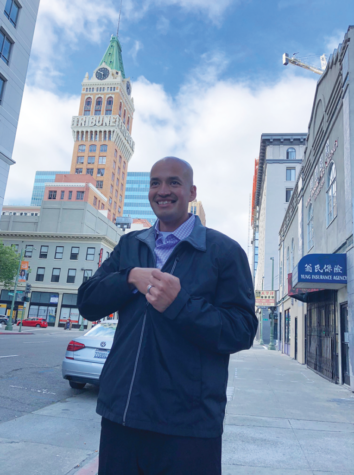
He also observed the way that people’s attitudes change before and after the pandemic.
“When it comes to public health crises, we are all equal…all of a sudden, we recognize humanity, whereas before…why do I have to justify I’m a human being?” said Vasquez.
Vasquez now works with Arsola’s Distribution Center and Community Services, helping formerly incarcerated individuals find transitional and permanent housing. On his own time, he works with members of his community in many other ways, including mentoring children. He emphasized the importance of being involved within the community to help curve incarceration.
“The stories that we see today, they weren’t created in a vacuum. These social conditions, they’re systemic,” said Vasquez in an interview after the event. “I’m not an abolitionist, but I hope one day, we will have less need of incarceration.”
Page Dukes, who was released from prison four years ago, also has many loved ones who are still incarcerated. She is the communications associate for the Southern Center for Human Rights and co-founder of Mourning Our Losses, a “crowd-sourced memorial” that profiles those who have died of COVID-19 in prisons, jails and detention centers.
She described COVID-19 deaths in prison as “justified negligence homicides.” When she realized that many of those who lost their lives were not being named, she set out to memorialize them and create a “space for disenfranchised grief for people in prison and their loved ones.”
“We wanted them to be represented as not just numbers on a dashboard but as people who had family members and loved ones and lives who had a right to exist just as much as anyone else, and who a right to medical attention, to care and to a chance to survive,” Dukes said.
Fenelon Jr. is the senior program coordinator for the Prison Education Project, where he works to provide classes to those who are incarcerated. The PEC, which is based in California, is one of the largest volunteer-based prison education programs in the country.
“The power of our program is really focused on trying to open up the door to the average citizen to get in and engage with those who are incarcerated,” Fenelon Jr. said. “So many decisions are made by those who have no engagement with those who are incarcerated.”
He emphasized the importance of incarcerated individuals having some connection with others.
“Part of illness is psychology,” said Fenelon Jr. “If you just know that someone cares, and is willing to make time to see you while you’re in that environment, it’s critically important”
Fenelon, who was incarcerated for 14 years, said that his experience with health issues in prison made him a “stronger panelist to speak on the state of healthcare in general, but specifically for COVID-19 within the carceral environment.”
Halfway through the event, Sibii posed a question to the panelists about the Commonwealth prioritizing incarcerated individuals in the vaccine distribution as well as vaccine hesitancy within prisons.
Many of the panelists emphasized the importance of providing additional guidance to incarcerated individuals so they can have the ability to make an educated decision on whether they want to receive the vaccine or not.
“Having informed choices, you’ll find the majority will [take the vaccine], and those who don’t, then you can address them in a way that is still effective and will respect their agency,” Fenelon Jr. said.
Yumi Cruz, a social thought and political economy major and member of the UMass PAC, facilitated the Q&A portion with Sibii and posed the question, “How does the systemic response to the pandemic reflect the general attitude towards incarcerated individuals?”
Nowotny, like other panelists, said it reflected how the public assigns less deservedness to those who are incarcerated. She rhetorically asked, “Why is it that the CARES Act spent an ungodly number of pages talking about nursing homes but not prisons? They both congregate living facilities that house people at high risk for COVID-19 and severe illness.”
The panelists also emphasized the importance of journalism and using humanizing language when talking about incarcerated individuals. Vasquez highlighted the issue of sensationalism in the media, including how some media agencies choose to profile people “with the most heinous criminal records” and fringe incidents when reporting on incarcerated individuals.
“The same way we hold the state accountable for their lack of action and their ill response, is the same way we should hold media agencies accountable for their willingness to perpetuate this institutional racism that exists,” said Vasquez.
The event ran for approximately an hour and a half. During that time, there were some issues that the panel had not discussed, Vasquez said. For example, the number of moving parts that factor into the issue of incarceration and combatting COVID-19, the weaponization of the pandemic to fit certain narratives, and the idea of having room for “compassion and understanding that…this was an unknown beast,” he said.
“The government is culpable to the extent that they can be for not responding to the way that they could have, but they had no alternatives. COVID had never struck before,” said Vasquez.
The event amassed around 60 attendees. Shane Appiah, an incoming freshman at Howard University, was one audience member. He found out about the event through Decarcerate Western Mass, a coalition that he has been involved with for the last five months.
“I am definitely left with more hope about abolitionist work [and] hope about the people who are doing the work,” Appiah said. “It’s spreading, it’s becoming a stronger thing that Western Mass is rallying behind.”
While considering the event’s takeaways, Fenelon Jr. said he hopes that audience members will remember to “care.”
“Care about people wherever they are, regardless of their circumstances [and] how they got there – whether they’re on the street, in prison, in a nursing home,” he said.
Nowotny, on a similar but different note, hopes that the event’s audience was angered enough to be moved to action.
“Anger is a powerful emotion, and it drives a lot of the work that I do,” she said. “The more you learn, the more pissed off… you get at the injustices that you see… If you bear witness to that, hopefully, you can become angry enough to be able to take action and do something about it.”
Editor’s note: Claire Healy is an Assistant News Editor at the Daily Collegian.
Sara Abdelouahed can be reached at [email protected]. Follow her on Twitter @AbdelouahedSara.
Saliha Bayrak can be reached at [email protected]. Follow her on Twitter @salihabayrak_.

